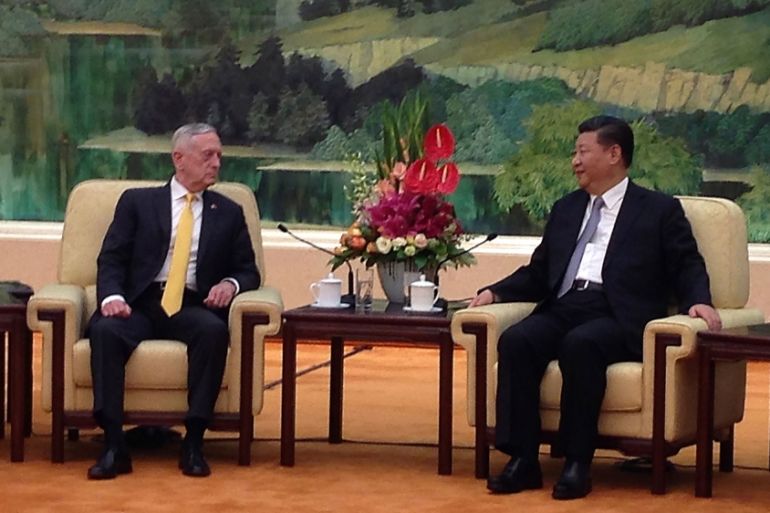China says it will not ‘concede an inch’ of disputed territories
President Xi Jinping tells US Secretary of Defense James Mattis that Beijing will guard its sovereignty.

Chinese President Xi Jinping has told US Defense Secretary James Mattis during a meeting that Beijing would “not concede an inch” regarding disputed areas such as the South China Sea and Taiwan.
“Our stance is steadfast and clear-cut when it comes to China’s sovereignty and territorial integrity,” Xi said according to Chinese news agency Xinhua.
Keep reading
list of 4 itemsPhilippines summons China envoy over water cannon attack in South China Sea
China coastguard blasts water cannon at Philippine coastguard ship
Philippines and China in new confrontation at Scarborough Shoal
“Any inch of territory passed down from ancestors can not be lost while we want nothing from others,” Xi added.
In recent years, China has increased its presence in the disputed South China Sea, claiming the majority of the territory and building several military bases.
Mattis met Xi during a trip to China, where the two called for strengthening relationships between the countries, including increased military ties.
During the meeting, Xi called the relationship between China and the US one of the most important bilateral ties in the world, adding that good ties between the two countries is conducive to world and regional peace.
The dispute over the South China Sea has led to increased tensions between China and the US in the last couple of years.
China is pitted against its smaller neighbours in multiple disputes in the South China Sea over islands, coral reefs and lagoons in waters crucial for global trade and rich in fish and potential oil and gas reserves.
It has begun building military structures on disputed islands – much to the dismay of other Southeast Asian nations including the Philippines, Indonesia, Malaysia, Taiwan and Vietnam.
Earlier this month, Mattis accused China of ‘intimidation’ in the South China Sea, saying China’s militarisation on man-made islands in the area “stands in stark contrast to the openness of [US] strategy” and “calls into question China’s broader goals”.
Those comments came on the heels of a string of events that highlight the tension between the world’s two biggest economies over the disputed sea.
Late last month, Beijing protested what it called a “provocation” after US warships came within 12 nautical miles (around 22km) of the disputed Paracel Islands, among a string of islets, reefs and shoals over which China has territorial disputes with its neighbours.
Earlier that week, the Pentagon withdrew an invitation to China to participate in the world’s largest multinational maritime exercise, RIMPAC, as “an initial response to China’s continued militarisation” in the region.
Taiwan, the other contested area Xi mentioned in his statement, is considered to be a renegade province and the subject is a sensitive one for China.
In 1979, the US adopted a “one China” policy under President Jimmy Carter, shifting diplomatic recognition of China from the government in Taiwan to the communist government on the mainland.
Under that policy, the US recognises Beijing as representing China, but retains unofficial ties with Taiwan.
Washington is Taiwan’s most important political ally and sole arms supplier, despite the lack of formal diplomatic ties.